
FTU Working Paper Series, Vol. 2 No. 3 (09/2021) | 71
CÁC NHÂN TỐ ẢNH HƯỞNG ĐẾN MỨC ĐỘ CÔNG BỐ THÔNG TIN
TRÁCH NHIỆM XÃ HỘI CỦA CÁC DOANH NGHIỆP NGÀNH THỰC PHẨM
VÀ ĐỒ UỐNG NIÊM YẾT TRÊN THỊ TRƯỜNG CHỨNG KHOÁN VIỆT NAM
Phạm Minh Anh1
Sinh viên K56 CLC Kế toán Kiểm toán định hướng nghề nghiệp ACCA – Khoa Kế toán Kiểm
toán
Trường Đại học Ngoại thương, Hà Nội, Việt Nam
Nguyễn Thị Thanh Loan
Giảng viên Khoa Kế toán Kiểm toán
Trường Đại học Ngoại thương, Hà Nội, Việt Nam
Tóm tắt
Luận án này nghiên cứu về các nhân tố ảnh hưởng đến mức độ công bố thông tin trách nhiệm xã
hội của các doanh nghiệp thuộc ngành thực phẩm và đồ uống niêm yết trên thị trường chứng khoán
Việt Nam. Nghiên cứu sử dụng phương pháp chỉ số công bố thông tin không trọng số để đo lường
mức độ công bố thông tin trách nhiệm xã hội của 48 công ty ngành thực phẩm và đồ uống niêm yết
trên sàn chứng khoán Việt Nam. Kết quả cho thấy mức độ công bố thông tin trách nhiệm xã hội
của các doanh nghiệp này là 46,99%. Kết quả của nghiên cứu cũng xác định bốn biến có tác động
tích cực ở mức thống kê đến mức độ công bố thông tin trách nhiệm xã hội bao gồm quy mô doanh
nghiệp, tỷ lệ sở hữu của cổ đông nhà nước, tỷ suất sinh lời trên tài sản và đòn bẩy tài chính. Trong
khi đó, khả năng thanh toán có tác động tiêu cực ở mức thống kê đến mức độ công bố thông tin
trách nhiệm xã hội. Bên cạnh đó, mức độ độc lập của hội đồng quản trị và tỷ lệ sở hữu của cổ đông
nước ngoài đều không ảnh hưởng đáng kể đến mức độ công bố thông tin trách nhiệm xã hội. Từ
đó, tác giả tiến hành đề xuất một số kiến nghị cho phía doanh nghiệp, nhà nước và sở giao dịch
chứng khoán nhằm khắc phục tình trạng doanh nghiệp chưa nhận thức được tầm quan trọng của
việc công bố thông tin trách nhiệm xã hội.
Từ khóa: Công bố thông tin trách nhiệm xã hội, thị trường chứng khoán Việt Nam, thông tin trách
nhiệm xã hội.
FACTORS AFFECTING CORPORATE SOCIAL RESPONSIBILITY
INFORMATION DISCLOSURE OF FOOD AND BEVERAGE COMPANIES
LISTED ON VIETNAM’S STOCK MARKET
Abstract
1 Tác giả liên hệ, Email: k56.1718820010@ftu.edu.vn
Working Paper 2021.2.3.06
- Vol 2, No 3

FTU Working Paper Series, Vol. 2 No. 3 (09/2021) | 72
The thesis studies on factors affecting the level of corporate social information disclosure of food
and beverage enterprises listed on Vietnam’s stock market. The research uses the unweighted
disclosure index method to measure the level of corporate social responsibility disclosure of 48
food and beverage companies listed on vietnamese stock exchange. The results show that the level
of corporate social responsibility information disclosure is 46,99%. The results also identify that
four variables have a statistically significant positive effect, including firm size, government
ownership, return on assets, and financial leverage while the current ratio has a statistically
significant negative effect on corporate social responsibility disclosure. Besides, the independence
of board of directors and foreign ownership do not have a significant influence on the level of
corporate social responsibility disclosure. From which, the author proposes numerous implications
for enterprises, the state, and the stock exchange to overcome the circumstance that enterprises have
not recognized the importance of corporate social responsibility information disclosure.
Keywords: Corporate social responsibility information disclosure, Vietnam stock market, Social
responsibility information.
In 1953, the term corporate social responsibility (CSR) was first mentioned in Social
Responsibility of Businessman by Howard Bowen. Accordingly, the term corporate social
responsibility refers to the link between the enterprise's sustainable development and core values
in business operations, in order to create shared value for the business and the whole society. This
term then became popular in developed countries from the last decades of the twentieth century.
Practicing social responsibility and disclosing business social responsibility information is now
mandatory in developed countries while CSR is still voluntary and has not been widely realized in
developing countries according to the research of Ali et al. (2017).
In the current context, Vietnam takes part in trade agreements such as the European Union
Vietnam Free Trade Agreement (EVFTA), the Comprehensive and Progressive Pacific Partnership
(CPTPP),... The awareness and implementation of the social responsibility of Vietnamese
businesses have never been more necessary than now. However, the official and transparent
disclosure of CSR information in Vietnam is still limited. Studies of social responsibility are
mostly in theory. There is very little research on the status of this topic. In addition, research that
studies the status of CSR information disclosure mainly focuses on large firms. There are few
studies implemented in small businesses or specific industries. in recent years, the F&B industry
is currently evaluated as one of Vietnam’s most potential and attractive business lines.
According to a research by Vietnam Report, the food & beverage (F&B) industry has the
largest proportion in Vietnamese spending expenditure, accounting for 35% of monthly spending
and 15% of the country’s GDP, this number is still expected to increase in the upcoming years.
BritCham Vietnam (2020) reported that Vietnam is the third fastest growing country in ASIA in
terms of food expenditure. Along with the potential development, implementing social
responsibility activities and disclosing social responsibility information of the F&B industry are
also being posed. In the context of participating in trade agreements, foreign markets highly
appreciate the implementation of CSR. This is considered as one of the first criteria for the export
of food and beverages. In addition, the Vietnamese market is increasingly attractive to foreign
enterprises. Implementing social responsibility is highly perceived by these enterprises as a
competitive advantage (Hoang Ngoc Hai, 2019). Consumers are also more increasingly concerned

FTU Working Paper Series, Vol. 2 No. 3 (09/2021) | 73
about social responsibility activities of enterprises. They are willing to pay 2-4 times more than
the current price for products from large and reputable businesses (Vietnam Report, 2020).
It can be seen that implementing CSR in the F&B industry will create a significant advantage
for businesses, which are the priority conditions to access the global market, competitive
advantage compared to FDI companies, and build a strong brand in domestic consumers.
1. Literature review
In the world, there has been much research done on CSR information disclosure and the
influence of factors on CSR information disclosure, both theoretically and experimentally.
Andrikopoulos et al. (2014) conduct research to study the determinants of implementing online
CSR information disclosure on the websites of 93 financial institutions in 4 major sectors
(banking, insurance, financial services, and investment) listed on the Euronext stock exchange for
the period 2009 - 2013. The results show that corporate size, financial leverage, and profitability
have a positive relationship, while market to book value has a negative relationship with the level
of information disclosure. Suttipun (2015) concludes the research results after analyzing the data
of 100 companies listed on the Stock Exchange of Thailand in 2013-2014. Factors as size of
company, type of industry have a certain influence on the level of information disclosure for
sustainable development.
In Vietnam, research focuses more on factors affecting transparency on information disclosure
in general or on compulsory or voluntary disclosure of enterprises in particular. The topic of social
responsibility or CSR disclosure has been studied recently but has a lot of limitations. And it is
still a quite new concept for information users or many businesses. Le Thi Na (2015) presents a
study on the influence of factors on the level of social responsibility information disclosure in
Vietnam by analyzing annual reports of 78 large-scale companies listed on HOSE in 2014.
Research results confirm that the factors of firm size, profitability, and firm age are positively and
significantly related to the level of CSR disclosure. Meanwhile, foreign ownership, financial
leverage, and business characteristics do not affect the level of information disclosure of
researched enterprises. The latest research is by Dang Ngoc Hung et al. (2018) on factors affecting
the level of information disclosure on social responsibility, sustainable development of listed
companies in Vietnam. The study used the index method and content analysis to measure the level
of CSR and sustainable development information disclosure in the annual reports of 289
companies. The results show that the level of disclosure of CSR and sustainable development
information in the annual report is relatively low at 37.23%. The study identified three factors
affecting information disclosure level, namely profitability, business size, and independent audit.
Three other factors of financial leverage, the number of board members, and the chairman of BOD
cum CEO do not affect the level of information disclosure on CSR and sustainable development.
2. Theoretical framework
2.1. Agency Theory
Developed by Jensen and Meckling in 1976, agency theory describes and addresses the
relationship between managers (agent) and shareholders (principal). Shareholders entrust
managers with the right to manage and run the business and they expect managers to do well to
increase their benefits. However, there are conflicts of interest between these two parties because
of the same goal of maximizing their own interests. Since managers want to be seen as protecting

FTU Working Paper Series, Vol. 2 No. 3 (09/2021) | 74
shareholder interests (Jensen and Meckling, 1976). One of the means by which managers signal
that they are acting in a way that protects shareholder interests is annual reports, sustainability
reports, and others (Watts, 1977). Agency theory also suggests that when information is
incomplete and asymmetric between owners and managers, conflicts will increase. And this issue
can be solved by increasing the level of information disclosure from business managers.
2.2. Sinaling Theory
Signaling theory was first introduced by Michael Spence in 1973. This theory considers
disclosure as a signal to the market to reduce information asymmetry, optimize financial costs, and
increase business value. By disclosing CSR information with financial information, businesses
will prove to investors that operational efficiency is accurate and reliable.
2.3. Political Economy Theory
Political economy theory is mentioned in a publication on positive accounting theory by
Watts and Zimmerman (1986). According to this theory, managers such as the state, trade unions,
and community groups can make policies related to the interests of enterprises (tax policies, fees,
monopoly restrictions, etc.) to promote corporate information disclosure. This forces companies
to disclose CSR information voluntarily if they want to avoid state inspection and control.
2.4. Proprietary Cost Theory
Proprietary cost theory states one of the biggest limitations in disclosure, which is the
competitive position of firms. Small and medium enterprises, if they disclose information to a
substantial extent, will adversely affect their competitive position in the market. However, the
disclosure of CSR information may create a barrier to entry for other enterprises or force
competitors to downsize. Thereby, the business is likely to receive competitive benefits and future
cash flows will increase. Thus, when choosing what information to disclose, managers will
consider the risks and benefits that may affect the competitive position of the enterprise.
3. Hypothesis development
3.1. Firm size and corporate social responsibility disclosure
As stated in political economy theory of Watts and Zimmerman (1986) as well as the research
by Cowen et al. (1987), large firms tend to disclose large amounts of CSR information voluntarily
to avoid control and inspection from authorities. Thereby, it also saves political costs and creates
a positive image for the business. Therefore, the following hypothesis is put forward:
H1: There is a positive relationship between firm size and the level of CSR disclosure.
3.2. Return on assets and corporate social responsibility disclosure
Research by Singhvi and Deasi (1971) suggests that when businesses operate effectively,
managers will actively disclose more information to agree on their reward level. Additionally, this
is also an opportunity to show the competence of managers and increase their value in the labor
market (Barako et al., 2007). Agency theory and signaling theory also confirm that businesses with
higher profits will tend to disclose more CSR information to create a strong impression and a
positive reputation of the company with investors. At the same time, the disclosure of more
information also positively affects the share price of the company. Therefore, the second
hypothesis is:

FTU Working Paper Series, Vol. 2 No. 3 (09/2021) | 75
H2: There is a positive relationship between the level of return on assets and the level of CSR
disclosure.
3.3. Current ratio and corporate social responsibility disclosure
Cooke (1989) showing that firms with low solvency also try to disclose as much information
as possible to explain why these firms are low solvency. Moreover, one might argue that corporate
managers of companies with a low liquidity ratio may publish more voluntary information in their
annual reports to satisfy stakeholders' information requirements. If this information is disclosed
reasonably, it will receive positive attention from investors and creditors. The third hypothesis is:
H3: There is a negative relationship between the level of current ratio and the level of CSR
disclosure.
3.4. Leverage and corporate social responsibility disclosure
Platonova et al. (2018) argue that companies with high debt ratios may have closer
relationships with creditors, so these companies must disclose more CSR information in their
annual reports. Research by Yang et al. (2008) and Pham Thi Thu Dong (2013) also find a
significant relationship between financial leverage and the level of CSR information disclosure.
Signaling theory has confirmed that the disclosure of CSR information is a positive signal,
informing the market about the performance of companies. From there, companies can build a
reliable image in the eyes of investors and creditors and easily access additional sources of loans.
The fourth hypothesis is proposed that:
H4: There is a positive relationship between the level of financial leverage and the level of
CSR disclosure.
3.5. Board independence and corporate social responsibility disclosure
Research conducted by Singhvi and Desai (1971) and Nguyen Thi Thanh Phuong (2013)
reveals a positive correlation between the independence of the BOD and the level of CSR
information disclosure. As stated in agency theory, to minimize information asymmetry between
inside and outside the company, independent board members often focus on developing long-term
and sustainable strategies instead of financial purposes. This also facilitates transparency and
sustainability of CSR information disclosure. To be consistent with the orientation of corporate
governance regulations for listed companies in Vietnam the fifth hypothesis is proposed that:
H5: There is a positive relationship between the independence level of the Board of Directors
and the level of CSR disclosure.
3.6. Foreign ownership and corporate social responsibility disclosure
The research results of Singvhi and Desai (1971) also suggest that most companies want to
approach and satisfy foreign investors. To do this, increasing information on CSR in annual reports
is imperative. Research by Haniffa and Coke (2005) has also found a positive relationship between
the rate of foreign ownership and the level of CSR information disclosure of listed companies in
Malaysia. Agency theory has affirmed that there is the information asymmetry that exists between
investors and managers. The disclosure of CSR information is a means which helps the
shareholders as well as managers to monitor their business activities. The following hypothesis is
proposed:


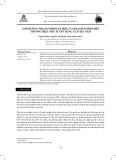
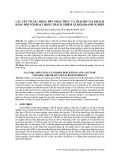
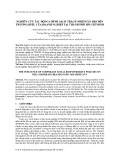
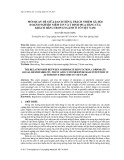
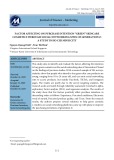
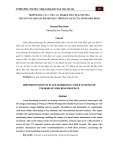
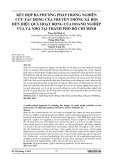
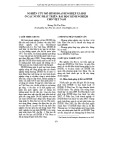
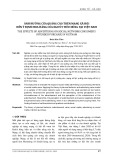
![Câu hỏi trắc nghiệm Nguyên lý Marketing: Tổng hợp [Mới nhất]](https://cdn.tailieu.vn/images/document/thumbnail/2026/20260124/hoahongxanh0906/135x160/37491769228050.jpg)














